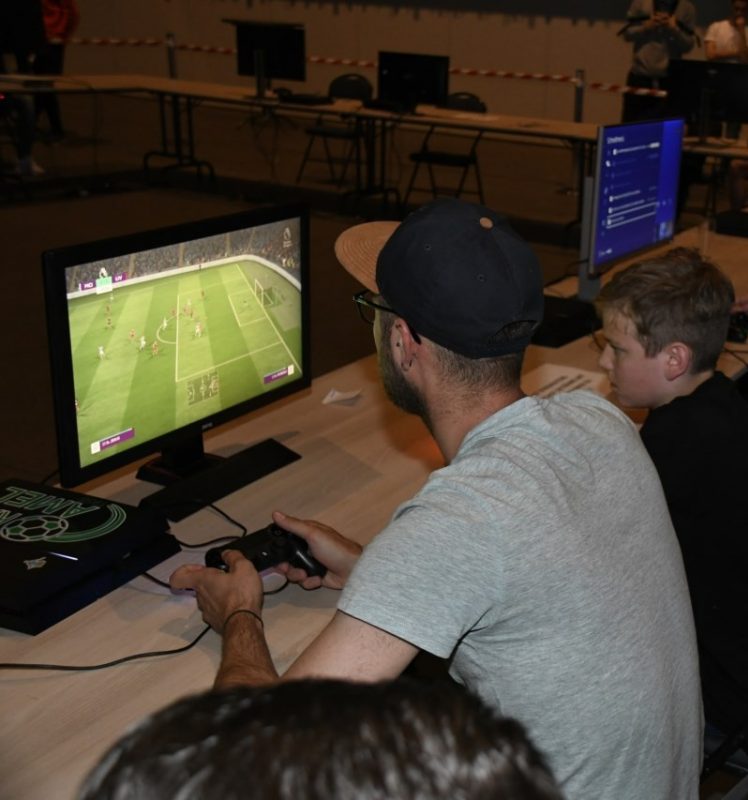The students of the 2018 graduating class of the Episcopal School of Saint Vith took up this challenge. In a project led by their teacher, Norbert Nicoll, they studied the e-sports movement in East Belgium. In the process, they produced important documents of self-reflection:
-
![Photo of the first official e-sports tournament in Sankt Vith, January 2018 (Source: E-Sports East Belgium)]()
Photo of the first official e-sports tournament in Sankt Vith, January 2018 (Source: E-Sports East Belgium) -
![Photo of the first official e-sports tournament in Sankt Vith, January 2018 (Source: E-Sports East Belgium)]()
Photo of the first official e-sports tournament in Sankt Vith, January 2018 (Source: E-Sports East Belgium) -
![Photo of the first official e-sports tournament in Sankt Vith, January 2018 (Source: E-Sports East Belgium)]()
Photo of the first official e-sports tournament in Sankt Vith, January 2018 (Source: E-Sports East Belgium)
-
What are e-sports?
E-sports (also spelled e-sports) is defined as competitive sports between people using computer games. Multiplayer mode is used so that players can compete against each other. Of course, as with any sport, there are rules. A distinction is often made between rounds played for fun and professional competitions. The rules are set by the software, i.e. the game itself, and by external competition rules, i.e. the rules of the competition organiser.
The two main platforms for the competitions are the computer and the PlayStation. It is important to note that in a professional event, the hardware equipment is the same for every player. No one has an advantage, e.g. because they have a better network connection or a more powerful computer.
The professional genre is almost entirely team-based. Clubs and groups require e-sports players not only to master the game, but also to demonstrate various motor and mental skills. These include reaction speed, stamina, spatial awareness, good orientation skills, tactical and practical knowledge of the game, and a good overview of the game. However, when playing as a team, which is almost always the case, you need to be adaptable and team-oriented.
The most important skill, apart from reaction speed, is hand-eye coordination. E-sports players need to react within in fractions of a second. Players are under a lot of pressure, just like in any other sport. The e-sports genre is not promoted everywhere. Many Asian countries have already recognised e-sports as a sport and offer training and so-called ‘boot camps’. Boot camps are similar to camps where players are drilled and promoted.
Arsen Karapetyan
-
E-Sports East Belgium
The association E-Sports East Belgium (ESEP) was founded on 19 May 2017. The members of the association then took part in various competitions under this name. On 31 January 2018, the association was registered in the Belgian national register. There, the association E-Sports East Belgium is registered as a ‘non-profit association’ (ASBL, association sans but lucrative).
Through this initiative, Kevin Parmentier, the founder of E-Sports East Belgium, wants to motivate young e-sports players in his home region. He strives to promote e-sports and make it more popular. A ‘community’ has been created in East Belgium.
The association does not take a political or religious stance, but stands for social justice and equality. Everyone is treated equally and fairly, regardless of race, gender, age, etc. Members of E-Sports East Belgium must abide by these rules. Any violation, whether within the community, a team, or towards third parties, will be punished. The association does not hesitate to terminate the contracts of members without notice. Members must also watch their language on social media.
‘Any racist, politically or socially derogatory statements as well as aggressive behaviour on any social media or platform will be strictly sanctioned by the ESEB and will lead to immediate termination of contract and expulsion of the members concerned. We reserve the right to take legal action,’ says Kevin Parmentier.
The main objective of the association is to promote e-sports in the German-speaking community of Belgium and beyond. The German-speaking community has a lot of e-sports talent. E-Sports East Belgium wants to promote these talents. The members of the association achieve this goal in various ways. They advertise, organise tournaments, and take part in championships at club level. The focus is on playing video games and encouraging people, but also on preventing dangers such as addiction. We give talks are given in schools as many players still attend them.
Finally, highlighting the social component is also on the ‘to-do list’. Meetings in the form of offline events and tournaments build ties and cohesion among players. No one is excluded and new members are recruited through advertising. Group activities such as trips to events are also organised.
Arsen Karapetyan
-
Interview with Kevin Parmentier
Do you consider e-sports to be a sport? Why/why not?
Yes and no. On the one hand, e-sports lacks the physical component of sport and therefore is not sport. On the other hand, e-sports brings many components that are needed for any sport. Reaction speed, intelligence, team spirit, ambition, communication, etc. However, if you define ‘sports’ such as chess, where the physical component is also missing, as a sport, then you should definitely consider having e-sports recognised as a sport.
When and why was E-Sports East Belgium founded?
E-Sports East Belgium was founded as a de facto association on 19 May 2017. However, tournaments in various competitions had previously been held under this name before. The registration of E-Sports East Belgium in the Belgian national register as a non-profit association took place on 31 January 2018. As a former competitive gamer, the contact with e-sports had always existed. At the age of 13, I took part in online tournaments for the first time. After participating in the Halo World Championship in London in February 2017, I decided to end my competitive career due to time constraints and invest my attention in a new idea.
After careful consideration and many conversations with people in the e-sports scene, the idea of creating an East Belgian ‘community’ turned into the non-registered association ‘E-Sports East Belgium’. The idea to combine my studies with one of my favourite hobbies was probably the main reason for the foundation. With a degree in ‘general management’, and with the motivation to promote young e-sports players in my home region, the first idea to create an East Belgium ‘community’ was born quickly. After two weeks of careful consideration after the HWC London and numerous discussions with representatives of the major e-sports associations such as FAB Games E-Sports and Evil Geniuses in London, the official launch of the organisation took place on 19 March 2017 via Facebook.
What are the aims of E-Sports East Belgium at the moment?
The aim of this association is to promote electronic sports (‘E-Sports’) in the German-speaking community and beyond. In particular, our focus is the support and promotion of East Belgian talents in all disciplines recognised as e-sports by the ESL. For this purpose, the following means are available: advertising of any kind, organising tournaments, participation in championships at association level (ESL for example) and outside of it, etc. The association can achieve these objectives alone or in cooperation with other clubs. Another objective of the organisation is the prevention of dangers inherent in e-sports, such as addictive behaviour. This prevention is carried out through educational work such as presentations at schools, repeated education about addictive behaviour, invitations from experts, and the like.
Furthermore, in case members run into trouble, ‘E-Sports East Belgium’ seeks direct contact with them and supports the affected member and, if necessary, establishes contact with professional experts. The association can achieve these goals alone or in cooperation with other associations.
A final objective of ‘E-Sports East Belgium’ is to highlight the social component of ‘e-sports’. All means are available to achieve this: through advertising of any kind, especially on social media platforms, by organising tournaments, offline events, group activities, participation in championships at association level (ESL & others), etc. The association can achieve these objectives alone or in cooperation with other associations.
‘E-Sports East Belgium’ does not have a political or religious stance but does promote social justice, equality, equal treatment (race, gender, age, etc.), and fairness (sporting as well as social) and expects this attitude from its members. Any violation of this attitude within its own community, within a team or towards third parties, may cause ‘E-Sports East Belgium’ to terminate the contract with a respective player or team playing under the name ‘E-Sports East Belgium’ without notice. ESEB strictly condemns any racist, political, or socially derogatory statements as well as aggressive behaviour on any social media or platform. Such behaviour will lead to direct termination of contract and exclusion of the members concerned. We reserve the right to take legal action.
Should e-sports be promoted in schools? Why/why not? If so, how?
In my opinion, promotion is the wrong term to associate e-sports with in schools at the moment. However, I do not rule out the possibility that e-sports could be promoted in schools at some point in the future. However, the focus at the moment should clearly be on education. Many people still see e-sports as negative or dangerous, and are uninformed. Of course, e-sports have risks, such as addictive behaviour or the loss of social activities, but e-sports also have positive characteristics and people should first be objectively informed about both sides of e-sports.
Politicians are already well on the way to analysing e-sports and defining the pros and cons (see note from the EU Parliament). Including this topic in the school programme provided for by the state would be an important step in this regard, even if the topic would only be touched on briefly. Another great means of education are public presentations or presentations at schools.
In your opinion, has e-sports changed over the years?
E-sports has changed tremendously over the years. The biggest proof of this is probably the prize money, which has gone through the roof. Prize money in the millions is no longer uncommon. With the constant development of the internet and its speed, e-sports have been offered an incredible number of opportunities in recent years. Nowadays, events can be followed live no matter when and from any location. The next step, which is already in full swing, will be the adoption of e-sports in TV programmes.
What does the future hold for e-sports in your opinion?
At the moment, we are really only at the beginning of the e-sports era. E-sports will definitely continue to grow for 10 years, until, in my opinion, it peaks. I think in 10 years the names of the big e-sports associations will be as familiar to everyone as the names of big sports clubs. It is uncertain where it goes from there.
Kevin Parmentier is the initiator of E-Sports East Belgium. The questions were asked in writing by Arsen Karapetyan and also answered in writing by Kevin Parmentier. The answers were received on 7 February 2018.
-
Are e-sports male?
Most players are indeed male. Girls and women are a minority (at least so far). This is especially true in East Belgium. However, the share of female fans is growing. While the professional e-sports teams are largely dominated by men, almost a third of the fans are female. Why are girls and women so much in the minority?
We think there are many reasons. One reason is that hobbies in our society are marketed in a gender-specific way, following socially accepted expectations and norms. Men are generally more attracted to games. E-sports is a male-dominated culture ‘that maintains its status through an anti-social and tech-savvy habitus, and that discourages – and is meant to discourage – women in particular’. This is what Nina Scholz writes in her book ‘Nerds, Geeks and Pirates – Digital Natives in Culture and Politics’ (2014). An argument often used in this debate is that women and men have different strengths and weaknesses. And that includes the fact that women are worse at playing games. There is no evidence to support this. It is more of a self-fulfilling prophecy. To prove herself, a woman has to meet much higher standards. E-sports professionals are mostly male. Women who have professional status are significantly underrepresented. They earn much less than men. We also find that games like football are much more discriminatory towards women. This also leads to a difference in wages.
Alina (18) and Aurélie (17), pupils at the Episcopal School of Saint Vith, say: ‘We haven’t had much contact with e-sports in our lives. We knew from the start that we were not interested in online games. It is incomprehensible to us how you can spend so much time in a non-real world. Besides, we would not spend money on such games because it is not one of our priorities. However, we don’t see this in a negative way, because everyone has the freedom to choose their hobbies, as long as the virtual world does not take precedence over the real world.’
Ellen Gommes, Fanny Roche, Aurélie Serexhe, Alina Plattes
-
Is East Belgium lagging behind in e-sports?
Yes, in a way it is. You can feel the difference between the centre and the periphery. And East Belgium is definitely on the periphery. So, there is a lot more going on in the cities in terms of e-sports. The Eifel region in particular has a problem with communication infrastructure. Fast internet for online gaming is not available everywhere – a real disadvantage. Overall, Belgium and Western Europe as a whole are lagging behind other parts of the world. While e-sports are becoming a popular sport in Asia, things are different in Europe. The best example of this is the game League of Legends.
Countries like Germany and Belgium, which have a large number of hobby players, e-sports fans, and professional e-sports players, do not recognise e-sports as a real sport. This frustrates many stakeholders who believe that e-sports should be seen and promoted as a real sport. In East Belgium, e-sports is still quite unknown. The association is still in its early stages. However, members of E-Sports East Belgium have been more present in the local media.
Arsen Karapetyan, Simon Heck
-
Why do people play it?
Bruno (17), a student at the Episcopal School of Saint Vith, says: ‘There are several reasons. Fun is the main reason why young people play so much. But it’s also about the social experience, the feeling of being part of a group, the feeling of success.’
Noah Chavet, member of E-Sports East-Belgium, says in the interview (in German)
Kevin Parmentier, founder of Esport East-Belgium, says in the interview (in German):




